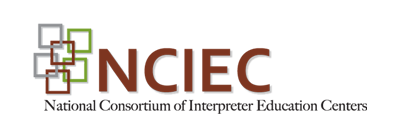Why Healthcare Interpreting
To Your Future Health
An infusion module for Interpreter Education Programs
Insight from Interpreters Experienced in Healthcare
Objective:
- To explore the specialty area of interpreting in healthcare settings in order to understand why it is a need and what it offers to interpreters choosing this specialty
Insight in ASL from Interpreters in Healthcare Settings
The following video reflections from interpreters with experience in healthcare settings.
Natalie Stanley:
Natalie is a staff interpreter with health care system in Minnesota. She shares why she finds her position to be so rewarding. She also shares some of the challenges and advice for interpreters considering working in this field.
Anthony Verdeja:
Anthony is an interpreter and educator who works in a variety of settings, including video relay and health care. He reflects about why health care interpreting is both challenging and something that can be an enriching experience – one we must approach with great care and a sense of responsibility.
Lisa Weems
Lisa shares about what drew her to medical interpreting and what keeps her wanting to work in the healthcare settings. Also, she provides some thoughts on what she think it is important for students to be aware of as they consider interpreting in healthcare.
Amy Williamson:
Amy is a private practice interpreter and educator with over 20 years of experience in healthcare settings – both interpreting for deaf patients and deaf medical providers going through medical school. She shares why she finds interpreting in healthcare settings to be such a meaningful experience for her.
Why Interpreting in Healthcare Settings
Download Word Version of Introduction | Download PDF Version of Introduction
“Extensive research has shown that no matter how knowledgeable a clinician might be, if he or she is not able to open good communication with the patient, he or she may be of no help.”
~ Institute for Healthcare Communication[1]
As a student in an interpreter education program, you may be contemplating the future of your career. In what direction do you want to go? Do you want a specific focus? Where can you make both a living and a difference? Interpreting in healthcare settings is a great possibility for you to consider.
Healthcare settings are ones in which the majority of Deaf people and their family members will be involved, and the value of qualified interpreters in these settings is evident. These settings can cover a wide gamut of hospitals, clinics, mental health and substance abuse facilities, private physicians’ offices, rehabilitation centers, domestic violence programs, and nursing homes, among others. Given the need, it is surprising to discover that a national needs assessment survey of Deaf consumers that was conducted by the National Consortium of Interpreter Education Centers (NCIEC, 2008) found that respondents identified these settings as the most difficult ones in which to obtain a qualified interpreter. Part of the reason for this may be the lack of standardized educational programs to prepare healthcare interpreters. This module provides an introduction and inroad into the field, and also offers suggestions for further avenues to developing the needed competencies for working in this area.
There is a wide range of skills needed to work successfully as a medical interpreter. For example, knowledge of medical terminology, procedures, conditions and treatments is needed, along with the ability to express these in both English and ASL. The CATIE Center at St. Catherine University, in St. Paul, Minnesota, in collaboration with the NCIEC, undertook an extensive consultation with medical interpreters and interpreter educators to identify the qualifications needed by medical interpreters. These included:
- Bilingual fluency in English and ASL including the ability to produce and comprehend sociolinguistic variation.
- Understanding of linguistic, social and cultural influences that impact health care interactions (e.g., specialized vocabulary, discourse styles, language register, dynamics of power and prestige between interlocutors, and triadic communication).
- Adhering to the Registry of Interpreters for the Deaf and the National Association of the Deaf Code of Professional Conduct and familiarity with the NCIHC code of ethics.
- Balancing the need for maintaining professional distance with empathy and flexibility.
- Knowing the laws and policies related to health care settings (e.g., liability, ADA, state’s human rights laws, hospital policies).
- Knowing the general physiological and psychological implications of health care.
- Understanding of various health care approaches (e.g., Chinese medicine, ayurvedic, holistic, homeopathic, Western medicine, hospice).
- Understanding underlying practices of various health care delivery systems and the role of self and others on the health care team (e.g., employing CDIs, Deaf Community Healthcare Workers [CHWs] and advocates when they can enhance the communication).
- Sharing information and resources about communication through advocacy, leadership, education in health care settings
(To see the complete “Domains and Competencies for Medical Interpreters”, click here.)
In working with this module, you will have the opportunity to experience some of the learning that medical interpreters need to acquire, and to practice applying this learning in your own interpreting. We hope this will encourage you to continue to learn the skills needed for working in healthcare settings, and that you will become one of the qualified interpreters Deaf people have identified needing.
[1] http://healthcarecomm.org/about-us/impact-of-communication-in-healthcare/
More Articles for “Why Healthcare Interpreting”
- Laurion, R. (July 2013) “Improving Healthcare: Specialization for Sign Language Interpreters”
from www.streetleverage.com/2013/07/improving-healthcare-specialization-for-sign-language-interpretersDownload Word version of article | Download PDF version of article - Allen, K. “The Time is Now for Healthcare Interpreting 2.0”
from interpretamerica.com/index.php/blogs/katharine-s-blog/104-katharine-s-blog-the-time-is-now-for-healthcare-interpreting-2-0 | Download Word version of article | Download PDF version of article
Reflective paper: Why Healthcare Interpreting?
Check with your instructor about how to provide your reflections on this activity.
You’ve had the chance to read an essay on the importance of interpreting in healthcare settings and view the videos of interpreters who work in medical settings. Please respond to the following questions:
- Did you realize that interpreting in healthcare settings was such a priority for the Deaf community? Does that understanding affect how you look at preparing to become an interpreter?
- How does the list of qualifications identified by the CATIE Center impact what you see as the priorities for your own professional development?
- What most intrigues you about medical interpreting after watching these commentaries?
- Which of the commentators most interested you, and why?
- If you had the opportunity to ask one of the commentators a follow-up question to their presentation, what would you ask, and why?
- Has anything you saw changed your ideas about whether you would work as a healthcare interpreter in the future? If so, how? If not, how have your ideas remained the same?
Copyright © 2013-2016 by the National Consortium of Interpreter Education Centers (NCIEC).
This NCIEC product was developed by the National Interpreter Education Center (NIEC) at Northeastern University. Permission is granted to copy and disseminate these materials, in whole or in part, for educational, non-commercial purposes, provided that NCIEC is credited as the source and referenced appropriately on any such copies.
Student Resources
This resource is intended to be included in your institution’s learning management system. Please return to your school’s web site for any activities.

